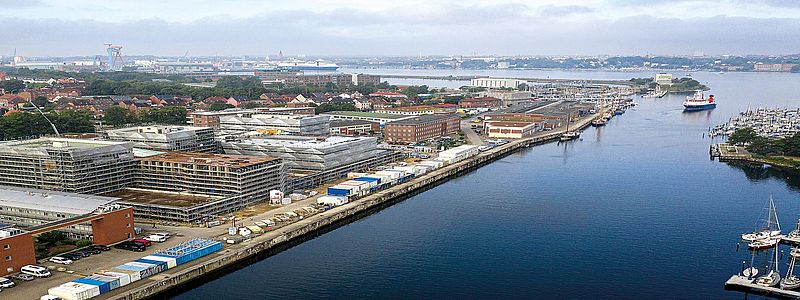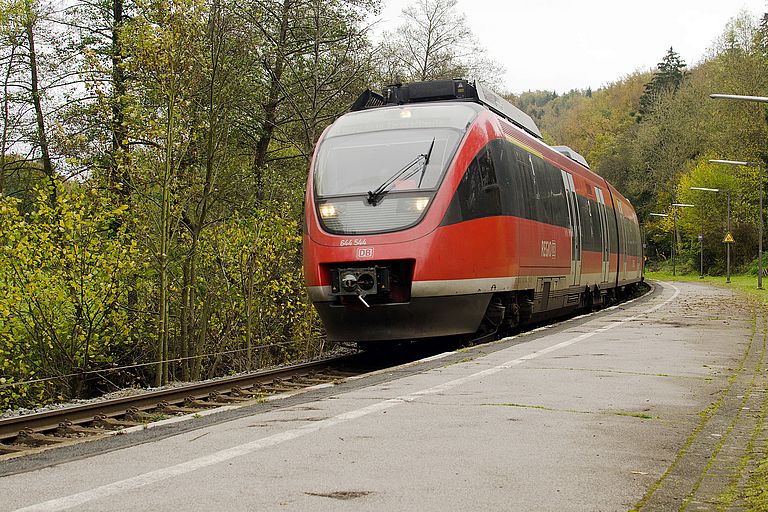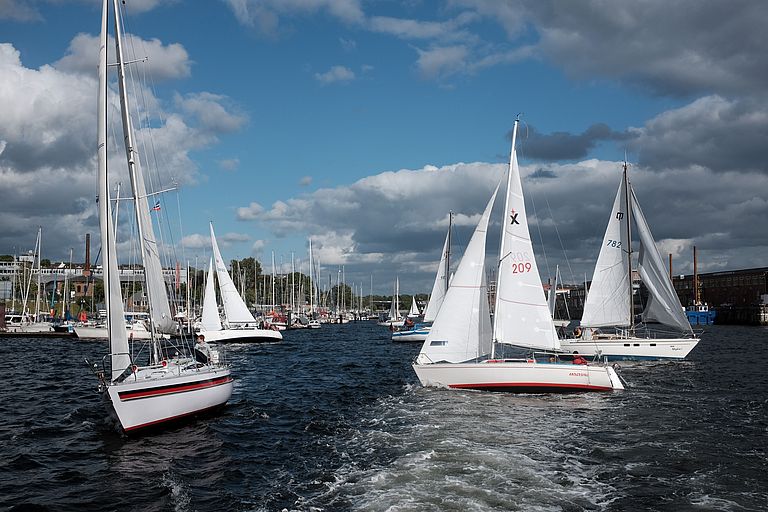How do I find a place in a kindergarden for my child? Do you need any help?
Please, contact our family support center by mail family(at)geomar.de or by phone (Tanja Nienaß -2536).
Parents at GEOMAR have organized themselfes and provide information via an email list. If you want to be a part of it, send a short information to parents(at)geomar.de
You have school age children?
All children living in Germany are required to attend school at least between the ages of 6 and 15. You usually decide which school to choose after a visit and an interview with the head teacher. The school must have capacity for your child at the time it is supposed to enter (e.g. in the middle of the school year).
The first four years, beginning at age 6, are spent at elementary school. After that, children attend secondary schools (see below).
Most of the schools in Germany are public schools without a school fee.
Nevertheless, you will have to pay between 20 and 50 EUR at the beginning of the school year for e.g. school teaching materials, copies and books. In addition, there might be extra costs for excursions and class trips.
Only very few private schools (in Kiel for instance there are Waldorfschule, Lernwerft, Gemeinschaftsschule Düsternbrook, Christliche Schule) charge a fee.
Children in Germany do not wear school uniforms and can dress, as they like.
From March 1, 2020 onwards, all children attending school have to be vaccinated against measles by law.
The school year begins after the summer break (the 6-week-break is between July and September) with the first grading period. The second grading period starts February 1 and ends with the summer break. School holidays are two weeks Easter break, six weeks summer break, two weeks autumn break and two weeks Christmas break.
Schools
Elementary school
Children that turn 6 years of age until June 30, have to attend elementary school (Grundschule) after the summer break. Generally, you have free choice in selecting an elementary school, except your child does not speak German properly. In this case your child usually has to attend a DAZ-Class (see "Schools for children with no or only very few skills in German language").
Elementary schools are from grade 1 to 4. Subjects are for instance German, Math’s, local History, and General Studies including traffic education, English, Music, Sports, Religion / Ethics and Art. Lessons only take place in the morning, school ends around noon. Most of the schools provide a warm meal and afternoon daycare or do so with help of a partner organization. Usually there is a waiting list for afternoon daycare places.
After three and a half years, pupils will have a conversation about their school performance together with their parents and their teacher, to find out which type of school they should select after elementary school. The elementary schools will also give information about the registration procedure for the secondary schools.
Secondary Schools
Secondary schools offer, in addition to the subjects known from elementary school, most of the following subjects: second and third foreign language (French, Spanish and Latin are common), Biology, Chemistry, Physics, History, Geography, Philosophy or Religion, Computer science, Engineering, Handicraft and others. The websites of the schools usually inform about the subjects they offer.
Most secondary schools offer afternoon daycare where homework can be done under supervision to some degree, especially for grades 5 and 6. In addition, there are often opportunities for leisure activities in the afternoon.
There are only two types of secondary schools in Schleswig-Holstein and Kiel: Comprehensive schools and Gymnasiums.
Comprehensive Schools (Gemeinschaftsschulen)
Comprehensive Schools start with grade 5. The focus is to prepare pupils for qualified jobs and apprenticeships. In grade, 7 pupils are divided into groups - in some subjects - according to their performance.
In comprehensive schools you can achieve "Erster allgemeinbildender Schulabschluss" (general school leaving certificate) after grade 9 and "Mittlerer Schulabschluss" (intermediate school leaving certificate) after grade 10. Few comprehensive schools in Kiel provide the possibility to achieve "Abitur" after grade 13 (senior school leaving certificate, the entrance qualification for higher education): Toni-Jensen-Gemeinschaftsschule, Gemeinschaftsschule Hassee, Gemeinschaftsschule Friedrichsort.
"Gymnasium"
In Gymnasiums pupils aim for the senior school leaving certificate (Abitur). Usually pupils are recommended for Gymnasium by the elementary schools. Abitur is the entrance qualification for higher education that gives access to University and academic training. Abitur is achieved in 9 years (after grade 13); in the former system it was achieved in 8 years, (there are still some classes in the old system). At Thor-Heyerdahl-Gymnasium, you can choose between 8 and 9 years to reach Abitur (it is the only Gymnasium, which offers this).
Lessons in Gymnasiums will also take place in the afternoon, at least on one day per week. The weekly hours in different grades (one school hour is usually 45 minutes) range between 30 and 36.
DaZ: Schools for children with no or only very few skills in German language
Children that have no or only very few skills in German language must attend a DaZ center. DaZ means "Deutsch als Zweitsprache" (German as second language). Besides other subjects, a DaZ class has a special focus on the subject German and offers intense individual support for each child. After your child has achieved enough German, reading and writing skills it will switch to a regular class. Usually this takes about one year.
After the child’s arrival in Kiel and it´s registration at the Kiel City Hall to get the proof of residence (Meldebescheinigung), you have to contact the "Zentrale Anmeldestelle DaZ" (central office for DaZ) to get a place in a DaZ center for your child. The DaZ-Coordinator will look for a school with a vacant place in a DaZ class for your child.
Address and contact:
Zentrale Anmeldestelle DaZ
Gutenbergschule
Gutenbergstraße 61
24118 Kiel
Phone:
0049-431-260912-81 (General Office)
Mail: Zentralanmeldung-daz.kiel(at)schule.landsh.de
International schools / Bilingual schools
There is no "International School" in Kiel. The next international schools are in Hamburg
Bilingual schools (German - English)
There are only very few bilingual schools in and around Kiel. Bilingual is understood as teaching single subjects (for example HSU, Geography, History) in English language instead of German language in addition to the regular English classes. All other subjects are held in German. Children profit from these additional lessons by improving their English skills in vocabulary, speaking and listening comprehension and therefore get more secure in discussing topics in English.
Muhliusschule:
Muhliusschule is a primary school (Grades 1 - 4), that teaches the subject HSU (General Studies) in English language instead of German language.
Ricarda-Huch-Schule:
Directly opposite the main university campus you find Ricarda-Huch-Schule, a secondary school (Gymnasium) from grade five upward. Ricarda-Huch-Schule gives the option to take Geography and History lessons in English language from grade seven to nine. All other subjects, except English, are taught in German though.
Gymnasium Altenholz:
Another bilingual school just outside Kiel in Altenholz is Gymnasium Altenholz that has the same option as Ricarda-Huch-Schule.
Afternoon daycare for school children
Elementary school usually ends around noon. If you have to study or work in the afternoon, you generally need afternoon daycare for your child. Most elementary schools, but also secondary schools, provide a warm meal and afternoon daycare, but it still can be difficult to get a place. Normally there are waiting lists. In addition, the opening times provided vary and daycare ends between 2 and 5 p.m... Please ask your school directly about afternoon daycare possibilities.





